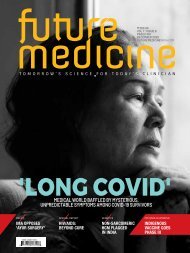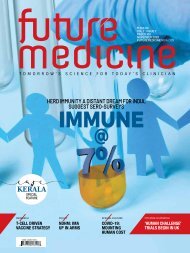FM JANUARY 2019 - digital edition
You also want an ePaper? Increase the reach of your titles
YUMPU automatically turns print PDFs into web optimized ePapers that Google loves.
case reports<br />
WHAT IT MEANS TO HAVE<br />
CYSTIC FIBROSIS<br />
An inherited autosomal recessive disorder, CF has few treatment options<br />
Gurvinder Kaur and Devender Singh gave birth to<br />
a normal 3.5 kg baby boy, Angad Singh, on 2 Nov<br />
2011 in Raipur. While everything was normal at birth,<br />
Angad Singh did not pass stools in the 24-48-hour window<br />
as expected. Angad’s abdomen was soon distended and<br />
he started vomiting green colored fluids. Based on these<br />
symptoms, Angad was thought to have Hirschsprung’s<br />
disease and he was referred to a paediatric surgeon who<br />
performed a colostomy and biopsy of the intestine. After the<br />
surgery, Angad now had a problem of loose stools and within<br />
2 months of age, he had lost considerable weight and was<br />
at 1.8 kgs. He was then presented to Dr K. N. Shah, a senior<br />
consulting paediatrician at Lilavati Hospital and Research<br />
Centre, Mumbai.<br />
At Lilavati, Angad underwent another biopsy, which<br />
turned out to be normal, and Hirschsprung’s disease was<br />
ruled out. Based on his history and the normal biopsy<br />
results, Dr Shah suspected that the child had meconium<br />
ileus, which is a bowel obstruction due to<br />
a sticky meconium in the intestine. The<br />
symptoms for meconium ileus are similar to<br />
that of Hirschsprung’s disease – distended<br />
abdomen, green vomit and no stools.<br />
Meconium ileus is most often associated<br />
with cystic fibrosis, and Gurvinder Kaur was<br />
counselled to have Angad undergo genetic<br />
testing to confirm the case.<br />
ABERRANT CFTR RESULTS IN<br />
AN ION MISBALANCE WHICH<br />
CAUSES THE FORMATION OF A<br />
THICK AND VISCOUS MUCOUS.<br />
SUCH MUCOUS CAN AFFECT<br />
THE FUNCTIONING OF THE<br />
PANCREAS AND LIVER, CAUSING<br />
DIGESTIVE SYMPTOMS<br />
Cystic fibrosis is an inherited autosomal<br />
recessive disorder caused due to a<br />
homozygous mutation in the gene for the<br />
cystic fibrosis transmembrane conductance<br />
regulator (CFTR). The most common gene<br />
mutation is the deletion mutation, ΔF508,<br />
which results in a non-functional CFTR<br />
protein. CFTR is a chloride ion channel<br />
required for creating sweat, digestive juices<br />
and mucous. Aberrant CFTR results in an ion<br />
misbalance which causes the formation of a<br />
thick and viscous mucous. Such mucous can<br />
affect the functioning of the pancreas and<br />
liver, causing digestive symptoms, or allow<br />
bacteria to hide from the immune system<br />
in the lungs, causing repeated respiratory<br />
infections. People with cystic fibrosis also<br />
40 / FUTURE MEDICINE / <strong>JANUARY</strong> <strong>2019</strong>


















